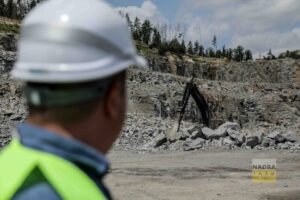
JSC Malynskyi Stone Crushing Plant, PJSC Pinyazevytskyi Quarry, and JSC Korosten Quarry have been allowed to return to granite mining.
According to NADRA.INFO, on Tuesday, 27.08.2024, the relevant order of the First Deputy Head of the State Service of Geology and Subsoil of Ukraine Volodymyr Buchko was published on the official website of the Service (download the order, appendix).
The renewal of the special permits became possible after a corrective decision of the National Security and Defense Council of Ukraine, which removed the use rights granted to the above-mentioned companies from the sanctions imposed on the owners of the companies, Olena Kalpa and Ihor Naumets. It is worth noting that this decision of the National Security and Defense Council also prohibits the payment of dividends or other payments on corporate rights in favor of the sanctioned owners or their representatives.
As a reminder, in 2023-2024. the State Service of Geology and Subsoil of Ukraine suspended a number of mining and prospecting special permits for the use of subsoil to Ukrainian companies on the grounds that the business owners had previously been sanctioned by the National Security and Defense Council. See the overview of the consequences here.
The Office of the President of Ukraine promised to organize the development of amendments to the legislation to unblock Ukrainian extractive companies. The European Business Association proposed to revise the sanctions policy in the field of subsoil use.
NADRA.INFO addressed the First Vice Prime Minister of Ukraine and Minister of Economy of Ukraine Yulia Svyrydenko and the Head of the Security Service of Ukraine Vasyl Malyuk with an open appeal to adjust the sanctions mechanism to restore the activities of Ukrainian extractive companies. The SBU considered the appeal and took it into account.
The Ministry of Economy of Ukraine also supported the need to resolve the situation with special permits for subsoil use suspended due to the NSDC’s imposition of personal sanctions on the ultimate beneficial owners of subsoil users.
Eventually, on June 24, 2024, the NSDC amended the previous sanctions decisions against Vadym Novynskyi and Vadym Yermolaiev and imposed 10-year sanctions on Dmytro Firtash (the so-called first corrective decision of the NSDC). After that, the State Service of Geology and Subsoil renewed nine special permits. The NSDC’s corrective decision also provided for the revocation of a number of special permits, but as of August, the State Service of Geology and Subsoil had terminated the subsoil use rights of only Vadym Novynskyi’s companies (one of the sites had already been included in the strategic list). Motronivsky GOK and Trends System avoided revocation amid the ongoing procedure of alienation of special permits and court injunctions (for more details, see here, here, here, here).

From September 1, 2022, Ukrainian carriers will be able to travel to Moldova under new simplified rules, according to the official Facebook page of the Ministry of Infrastructure of Ukraine.
“After the signing of the “transport visa-free regime” with the countries of the European Union, Moldova remained the only state on our borders with which the permit regime for Ukrainian carriers was not completely abolished. Given the large volume of cargo that is now going towards Moldova, the signing of a bilateral protocol removes the risk of stopping our exports,” the ministry stressed.
The permit regime will be maintained for non-scheduled passenger traffic (next year, the parties will exchange 2,200 permits) and for traffic to or from third countries (Ukraine will receive 10,000 permits by 2023).
“Bilateral cancellation of permits for international freight transportation, the opening a few days ago of the Berezyne-Basarabeasca railway section, which has not been operating for more than 20 years, are excellent examples of cooperation in the transport sector, strengthening interaction between Ukraine and Moldova. Now our task is to make the most of new opportunities for strengthening the economies of our countries in the face of the threats posed by Russian military aggression and Russian policy in general,” Infrastructure Minister of Ukraine Oleksandr Kubrakov said.

Ukraine and Bulgaria have agreed to expand bilateral cooperation in the field of road transportation.
According to the Ministry of Infrastructure of Ukraine, following a meeting of the mixed commission on international road transportation of goods and passengers, the parties agreed that in 2021 Ukrainian carriers will additionally receive 3,000 universal permits, of which 600 will be available at the points of issuance of permits starting next week. For 2022, the quota of permits has been increased by almost 25%, from 20,300 to 25,500. In addition, the universal permit form can be used for bilateral, transit and combined modes of transportation.
“The increase in the number of transport permits with Bulgaria is a good indicator of the development of our trade relations with the EU. We expect similar decisions from our other European partners. When we signed an Association Agreement with the EU in 2015, one of the key foundations for strengthening economic cooperation was that the dynamics of trade should not deteriorate. On the basis of this principle, the further policy of the Ministry of Infrastructure on international transportation will be formed,” Deputy Minister of Infrastructure Mustafa Nayyem is quoted as saying.